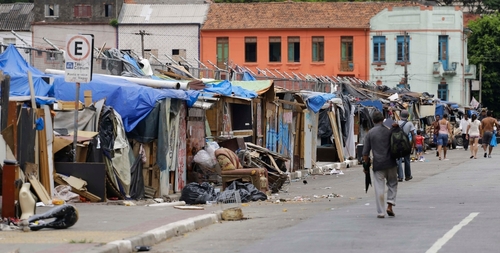
In the wake of a harrowing fentanyl crisis, Portland has declared a state of emergency, a stark testament to the city's deteriorating public safety and health landscape. This declaration comes three years after Oregon's controversial decision to decriminalize the possession of all drugs, including heroin and cocaine, a move that has since been met with intense scrutiny and backlash.
The once-thriving city of Portland is now grappling with the consequences of its progressive drug policies. Opioid deaths in Oregon have more than tripled since decriminalization, from 280 to a staggering 955 in 2022. The streets of downtown Portland, once bustling with commerce and community, are now marred by the visible scars of addiction and homelessness, which have surged by 65 percent from 2015 to 2023.
The governor of Oregon has declared an emergency for the city of Portland, just a few years after it became the first state in the nation to largely decriminalize drug use. pic.twitter.com/2xwO4irf7Z
— CBS Mornings (@CBSMornings) January 31, 2024
This crisis has not only taken a toll on public health but also on the city's economy and reputation. Major employers have fled, citing rising crime levels and rampant homelessness as their impetus for departure. Walmart, for instance, closed all of its Portland locations, a move preceded by warnings from its CEO about historic rises in theft. The exodus of businesses and the visible increase in open-air drug markets have fueled a sense of urgency among residents for a return to law and order.
Despite initial cuts to the police budget in June 2020, following Black Lives Matter protests and the 'defund the police' movement, Portland officials were compelled to reverse course. The city increased its police budget by $5.2 million a year later in response to the escalating crisis. Yet, this measure seems to be too little, too late, as a poll commissioned by the Portland police union reveals that more than half of voters would consider leaving the city if they could afford it, with 68 percent believing Portland is "on the wrong track."
Portland declares 90 day emergency for Fentanyl crisis
The same city council that defunded the police in 2020.Dem-led Portland declares state of emergency over fentanyl crisis
Oregon leaders have declared a 90-day state of emergency in Portland to battle the city's… pic.twitter.com/sHmN172bAM— floridanow1 (@floridanow1) January 31, 2024
Oregon lawmakers, recognizing the gravity of the situation, have introduced a bill to undo key parts of the state's drug decriminalization law. Public opinion has soured on the policy as the correlation between drug decriminalization and the rise in homelessness and public drug use becomes increasingly apparent. The city council's unanimous approval of an ordinance prohibiting public drug use is a step in the right direction, but its enforcement is currently stalled due to legal challenges.
As Portland navigates through these tumultuous times, the city serves as a cautionary example for other municipalities considering similar decriminalization measures. The balance between compassionate drug policies and maintaining public safety is delicate and complex. It is a sobering reminder that good intentions must be paired with practical strategies to prevent the descent into chaos and despair that Portland now faces.












